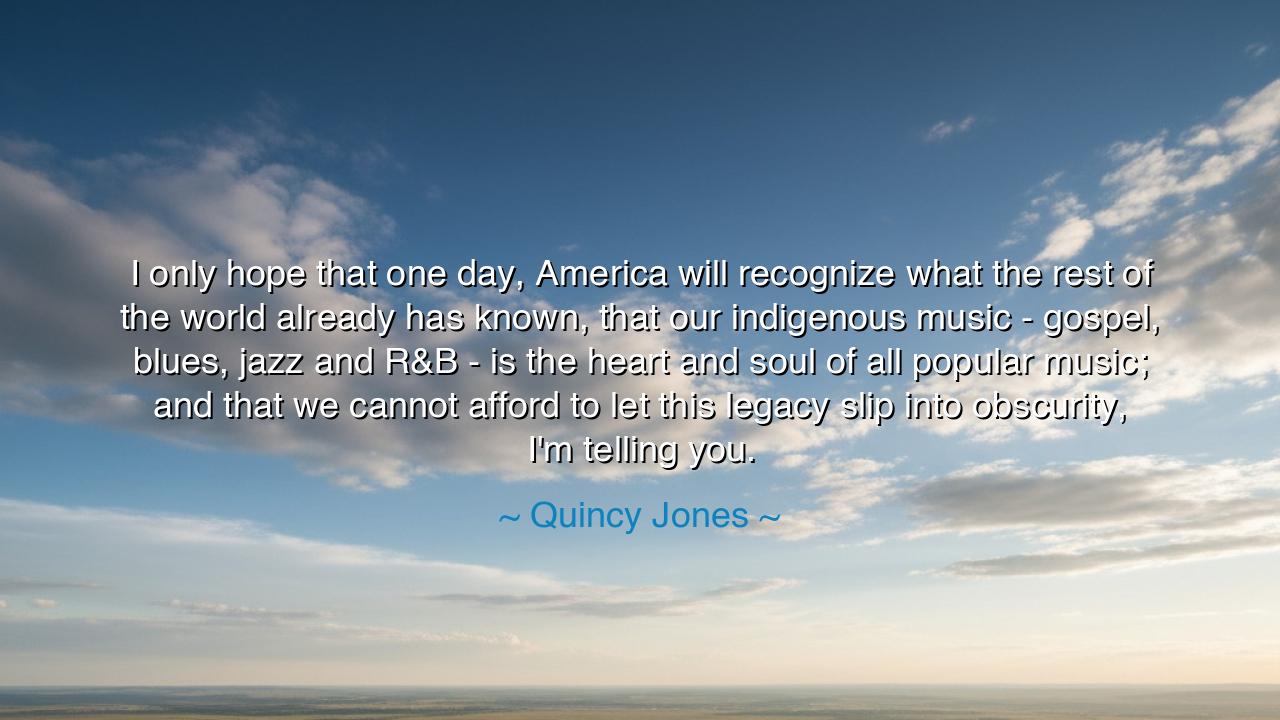
I only hope that one day, America will recognize what the rest of
I only hope that one day, America will recognize what the rest of the world already has known, that our indigenous music - gospel, blues, jazz and R&B - is the heart and soul of all popular music; and that we cannot afford to let this legacy slip into obscurity, I'm telling you.






“I only hope that one day, America will recognize what the rest of the world already has known, that our indigenous music — gospel, blues, jazz and R&B — is the heart and soul of all popular music; and that we cannot afford to let this legacy slip into obscurity, I'm telling you.” — so spoke Quincy Jones, the maestro of rhythm and sound, the bridge between eras, whose genius wove together the threads of every American melody. His words ring not as mere lament, but as prophecy — a warning to a nation that has too often forgotten the source of its own heartbeat. In these words burns the fire of memory, pride, and reverence: the reminder that music, born from struggle and faith, from pain and joy, is the soul of a people — and that to neglect it is to lose the soul itself.
Quincy Jones was not speaking from theory, but from the long and living history of Black America, whose songs were forged in chains and set free by spirit. The blues rose first — the cry of the enslaved and the poor, the echo of field hollers and sorrow songs that carried both mourning and defiance. From that deep river flowed jazz, that untamed conversation of horns and hearts, where freedom found voice in improvisation. From the church pews came gospel, thunderous and holy, rising like incense from weary souls who refused to stop believing. And from their union was born rhythm and blues, the pulse that later gave life to rock, soul, and even hip-hop. These are not separate streams — they are the sacred waters of America’s music, born of the African diaspora and sanctified by suffering and triumph.
Jones’s plea — “we cannot afford to let this legacy slip into obscurity” — is both a cultural and moral warning. For he knows that nations that forget their roots lose their direction. America’s music, though embraced around the world, has often been misunderstood or undervalued in its homeland. The world hears jazz as art, blues as philosophy, gospel as soul, but America too often hears them as background noise, forgetting that they were the language of survival, the poetry of a people who built beauty out of bondage. In every note of gospel is a cry for redemption; in every riff of jazz, the breath of freedom; in every wail of blues, the truth of human endurance.
Consider the story of Louis Armstrong, whose trumpet spoke more powerfully than speeches could. Born in poverty, rising through the rough streets of New Orleans, he transformed the spirit of his people into universal joy. When Armstrong played, the whole world listened — yet in his own country, he still faced segregation, prejudice, and indifference. It was as though America loved the sound but not the soul behind it. Quincy Jones, who stood upon the shoulders of men like Armstrong, calls us to remember: the music that moved the world came from the soil of struggle, from the tears and laughter of a people too alive to be silenced.
The origin of this music is not found in academies or palaces, but in the human heart. It is a gift shaped by the African-American experience, yet it belongs to all who feel. When Jones says that these forms are “the heart and soul of all popular music,” he speaks the truth of lineage — that every pop melody, every rock anthem, every soul ballad carries within it the rhythm first beaten on the drums of Congo Square, the harmony first sung in the churches of the South, the swing first born in smoky clubs of Harlem. To lose this connection is to lose our story, to let the living thread of heritage unravel into silence.
And yet, hope shines in Jones’s words. He does not condemn; he calls to awaken. His “I only hope that one day, America will recognize...” is not despair but faith — faith that awareness, gratitude, and education can restore what has been overlooked. The rest of the world, he reminds us, already knows: in Paris, in Tokyo, in Rio, the sounds of jazz and blues are revered as art forms, studied and celebrated. Only in the land of their birth must they still fight to be seen for what they are — treasures of humanity.
Therefore, let this be the lesson: remember your roots. Whether in music, culture, or life itself, honor the hands that built what you stand upon. The young must learn the names of the elders — the Bessie Smiths, the Duke Ellingtons, the Aretha Franklins, the Ray Charleses — for these were the architects of modern sound. Listen to their music not as nostalgia, but as revelation. Study their craft, protect their legacy, and let their spirit guide creation anew.
For in truth, as Quincy Jones reminds us, the heart and soul of America beats to the rhythm of those songs born in hardship and redeemed by hope. To lose them is to lose ourselves. Let us, then, be the keepers of that flame — to preserve, to teach, and to carry forward the sacred inheritance of gospel, blues, jazz, and R&B. For they are not merely genres of music; they are the living soul of a people, the proof that beauty can rise from suffering, and that through the power of song, humanity remembers how to be whole.






AAdministratorAdministrator
Welcome, honored guests. Please leave a comment, we will respond soon